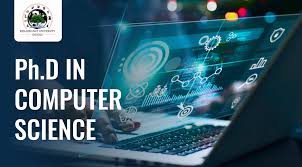Introduction:
A Ph.D. in Computer and Information Sciences offers an advanced academic pathway for individuals passionate about driving innovation in technology. This degree involves rigorous research in various domains of computing, from artificial intelligence and software development to network security and data science. Graduates are prepared to lead technological advancements, contribute to academic research, and innovate in the rapidly evolving digital world.
Admission Process:
- Application Submission: Fill out an online application form and submit it along with required documentation.
- Transcripts and Degrees: Provide transcripts showing a strong academic record, particularly in related undergraduate and master's programs.
- Letters of Recommendation: Obtain at least three letters of recommendation from academics or professionals in the tech industry.
- Statement of Purpose: Write a compelling statement outlining your research interests and career goals in computer and information sciences.
- Research Proposal: Submit a detailed research proposal showcasing your understanding of the subject and proposed research area.
- Interview: Participate in an interview with faculty members to discuss your research interests and assess your fit for the program.
Eligibility:
- Educational Background: Master’s degree in computer science, information technology, or a closely related field.
- Research Experience: Proven experience in research, demonstrated through publications, projects, or previous research roles.
- Technical Proficiency: Strong programming skills and familiarity with various programming languages and technologies.
- Analytical Skills: Exceptional problem-solving skills and the ability to think logically and critically.
- Communication Skills: Excellent written and oral communication skills, crucial for disseminating research findings.
- Innovative Thinking: A track record of innovative thinking and the ability to propose novel solutions to complex problems.
Completion Time:
Typically, a Ph.D. in Computer and Information Sciences takes about 4-6 years to complete, depending on the student's research scope, dissertation topic, and study pace.
Career Opportunities:
- Academic Researcher/Professor: Conduct research and teach at universities and colleges.
- Industry Research Scientist: Develop new technologies and innovations for tech companies.
- Software Development Manager: Oversee projects and development strategies in software companies.
- Chief Technology Officer: Lead technological initiatives and strategies at a corporate level.
- Data Scientist: Specialize in data analytics, machine learning, and statistical modeling to interpret complex data.
- IT Consultant: Advise businesses on technology strategies and implementations to improve efficiency and capability.
Syllabus:
- Advanced Algorithms: Study of complex algorithms and their applications in solving real-world problems.
- Machine Learning and AI: Exploration of artificial intelligence techniques and machine learning frameworks.
- Data Management and Analysis: Techniques for managing, storing, and analyzing large sets of data.
- Network Security: Study of advanced security protocols and methods to protect data and systems.
- Software Engineering: Deep dive into software design, development processes, and testing methodologies.
- Human-Computer Interaction: Examination of how humans interact with computer systems and how to improve those interactions.
Internship Opportunities:
- Tech Giants: Internships at companies like Google, Microsoft, or Amazon focusing on software development, machine learning, or data analysis.
- Start-Ups: Hands-on experience in dynamic start-up environments, often with a focus on innovation and rapid development.
- Government Agencies: Opportunities to work on information systems and technology solutions that impact public services.
- Research Institutions: Collaborate on cutting-edge research projects that align with your dissertation.
- Non-Profit Organizations: Apply information technology to solve real-world problems and support various causes.
- International Tech Firms: Gain global experience and exposure to different technological landscapes and challenges.
Scholarships and Grants:
- University Fellowships: Financial support that typically covers tuition and provides a stipend.
- Research Grants: Funds designated for specific research projects or technology development.
- Corporate Sponsorships: Support from tech companies interested in specific areas of research.
- Government Scholarships: Scholarships offered by government bodies to promote advanced research in technology.
- International Scholarships: Opportunities for studying abroad or collaborating with international researchers.
- Conference Grants: Funding to attend and present at national and international tech conferences.
FAQs:
What are the core research areas in a Ph.D. in Computer and Information Sciences?
Core areas include artificial intelligence, cybersecurity, data analytics, software engineering, and network architectures.
What is expected in the dissertation for a Ph.D. in this field?
A dissertation should contribute original knowledge to the field, demonstrate rigorous research, and offer solutions to complex problems in technology.
Can I work while completing my Ph.D.?
Many programs offer flexible options for students to work, especially in roles that complement their academic and research activities.
What skills are crucial for success in this Ph.D. program?
Technical skills in programming and systems design, research abilities, analytical thinking, and strong communication skills are crucial.
How can I maximize my Ph.D. journey?
Engage deeply with your research, collaborate across disciplines, publish your work, and network within academic and professional communities.
















